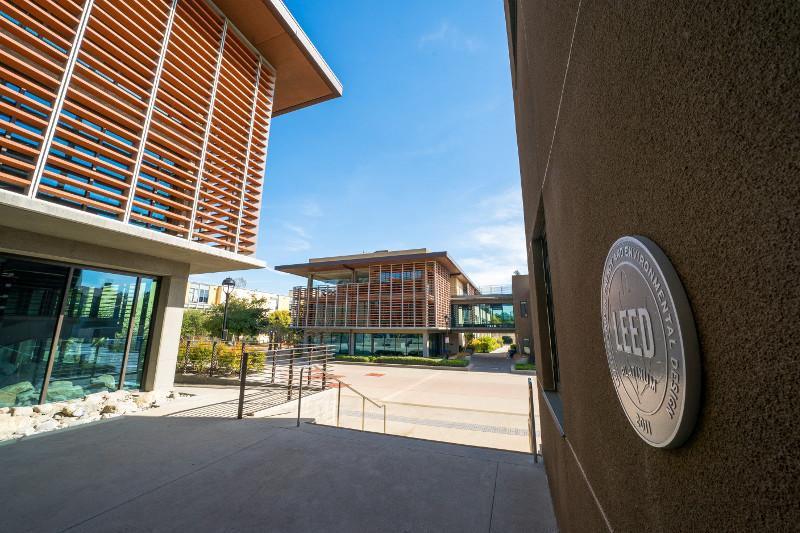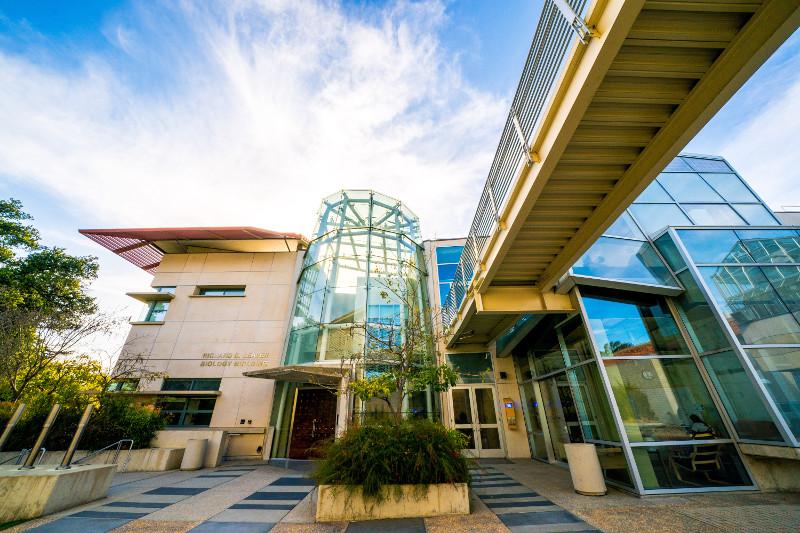Pomona College has a longstanding commitment to environmental action, from grassroots activism to institutional goals, like achieving carbon neutrality by 2030. Expand each tab below to learn more about significant sustainability milestones over time.
Timeline
2023
August 2023
Pomona College hired Trenton Leslie as the assistant director of energy programs. His work will focus on reducing campus energy usage and helping meet the college's 2030 carbon neutrality goal.
2022
February 2022
The EcoReps launched the Walker Flea Market— a space where students can sell clothing, handmade items, and more. The event promotes a circular reuse culture and sustainable living.
October 2022
The Center for Athletics, Recreation and Wellness (CARW) officially opens to the public. As a LEED Platinum building, CARW has a lower energy, water, and waste impact compared to other athletic facilities.
2021
February 2021
The EcoReps launched GrowGetters, a virtual plant club where students could receive tomato or basil starter seeds with care tips and a community board to share information, questions and photo updates.
June 2021
While the campus was closed due to the pandemic, the Sustainability Office hosted a virtual summer internship. The student team published the first-ever online and fully interactive SAVE Annual Report.
August 2021
As the campus re-opened due to the pandemic shutdown, Human Resources launched a pilot program allowing staff and faculty to work remotely. This program contributed to a reduction in commuting-related emissions.
2020
October 2020
The EcoReps published a biweekly EcoNews Bulletin so that students could stay connected with sustainability activists, initiatives and information.
April 2020
While the campus was closed due to the pandemic, the Pomona Collage Organic Farm donated plant seedlings to over 100 staff members and donated 115 lbs of produce to Uncommon Good.
2019
April 2019
Remy Rossi (PO'19) and Jojo Modeste (PO'19) receive funding through the President's Sustainability Fund to install a bike repair station outside of Frary Dining Hall.
October 2019
Sara Sherburne (PO'19) received the AASHE Campus Sustainability Research Award for her senior thesis, "Let's Get Sorted: The Path to Zero Waste at Pomona College."
November 2019
Dining Services partnered with students to expand Farm to Frank by hosting Farm to Frary in the fall. The event highlighted plant-based dishes and supported small family farms like the Thao
Family Farm in Fresno and the Beylik Family Farm in Ventura County.
2018
February 2018
The cookware & bakeware checkout program is launched. Students are able to borrow cookware and bakeware from the Sustainability Office for short-term use.
May 2018
Pomona College launches its first ever Zero Waste Commencement under the direction of Abby Lewis (PO'19). All food, plates, napkins, and utensils are composted instead of thrown away into the landfill.
October 2018
Pomona College hosts its first ever Zero Waste Founder's Day— a lunch for over 1,500 people.
2017
February 2017
Pomona College is awarded a $2.5 million grant from the California Energy Commission to create self-driving buildings with precise energy monitoring and management.
March 2017
Green Bikes receives funding from the President’s Sustainability Fund for a mobile workstation to increase the accessibility of their services, which include on-site tune-ups on student’s bikes and bike safety education.
August 2017
Pomona College begins construction of the new Museum of Art, which is designed to be LEED gold certified.
October 2017
The Free Room program is launched under the direction of Sara Sherburne (PO'19) where students can donate or take items such as clothing, shoes, accessories, and bedding in an effort to divert waste.
November 2017
Pomona College is named a top 10 performer in sustainability in the 2017 Sustainable Campus Index by the Association for the Advancement of Sustainability in Higher Education.
2016
January 2016
Coop Store and Coop Fountain stop purchasing bottled water.
May 2016
Pomona begins retrofitting the outdoor light poles to LEDs. The LED lighting provides improved security and safety while reducing electric consumption.
October 2016
Pomona hosts a week-long Sustainability Festival, featuring collaborations with the Pomona Student Union, the Hive, Art After Hours, Divest Pomona, and the Pomona College Organic Farm.
2015
May 2015
Over 700 individuals participate in the Sustainability Office's reusable Greenware program.
July 2015
Facilities and Campus Services reorganize and hire a Director to lead Projects, Energy and Sustainability to create and implement a plan for achieving Carbon Neutrality by 2030.
October 2015
Pomona hosts Know Tomorrow, a student-led Climate Change Awareness event featuring an activity fair, speakers, and prizes. The even is also covered in the award winning documentary series Years of Living Dangerously.
November 2015
Pomona partners with MelRok to create an energy and water analytical platform that manages, measures, and evaluates real-time and historical usage.
2014
March 2014
Pomona cosponsors conference on “Water Scarcity and Solutions: Global to Local.”
Pomona installs new water filtration and treatment system predicted to save two million gallons per year.
April 2014
Students in Pomona residence halls reduce their water use by 65,904 gallons over 21 days to earn a top five spot in the Campus Conservation National 2014 water reduction competition.
Pomona's composting program is featured in a Composting.org story encouraging small-scale compost projects on college campuses.
The 2012-13 Annual Sustainability Report notes a more than 50 percent increase in renewable energy production over the prior year, a decrease water usage by 4 million gallons, and, in Dining Services, 44 percent of produce sourced locally and 39 percent of seafood purchases sustainable.
The President's Sustainability Fund projects included a bike repair station, water bottle refill station at the Smith Campus Center and waste-free Class Day.
July 2014
Pomona included on the 2014 "Teaching Sustainability: 100 Colleges Doing 'Green 'Right" list by BestCollegeRankings.org.
October 2014
New 35,000 square-foot Studio Art Hall built to LEED-Gold standards celebrates opening. The College currently has eight buildings certified to the U.S. Green Building Council's Leadership in Energy & Environmental Design: two platinum, five gold and one silver.
December 2014
The Pomona College 2013-14 Sustainability Annual Report was released. Highlights include: the College's pledge to reach carbon neutrality by 2030, a seven percent cut in green house gas emissions, 7.8 percent reduction in energy use, campus waste reduction of six tons, and a 17 percent increase in composting over the prior year.
2013
January 2013
Pomona College joins Sustainable Claremont as an institutional member.
February 2013
Highlights of the 2011-12 Sustainability Annual Report include: a tremendous increase in on-campus energy production to an estimated 921,010 kWh with the addition of Pomona and Sontag Residence Halls and the South Campus Parking Facility. Pomona also metered 51 of 58 buildings on campus for electricity use. The President's Sustainability projects included post-consumer composting in dining halls, occupancy sensors in vending machines, a solar tracker for research on the roof of the North Campus residence halls, and a blower door for physics students to conduct home energy audits.
March 2013
Pomona hosts first the Community Engagement and Sustainability Powwow filled with a wide variety of Native cultural experiences, including drumming performances and traditional Native American dances.
June 2013
Pomona hires Michelle McFadden as the College's first energy manager.
Summer 2013
More than 51,000 square-feet of asphalt is removed from the former Bridges Auditorium parking lot to make room for a green, outdoor meeting space. New surface material is permeable allowing ground water recharge.
August 2013
Pomona College named to The Princeton Review “2014 Green Honor Roll”, one of only 22 colleges in the country earning the highest possible score (99), and included in the Princeton Review's 2013 Guide to Green Colleges.
October 2013
The three building compound for Grounds and Housekeeping, completed earlier this year, are certified LEED Gold.
September 2013
More than 21 tons of items are diverted from landfills due to Operation Clean Sweep and sold at the ReCoop sale.
December 2013
Pomona finishes installing individual building water meters on all residence halls and dining halls.
2012
June 2012
Greening of Dartmouth and Second Street parking areas complete. Planted primarily with sustainable and native vegetation, the area includes a pergola, bench swings, tables and an outdoor kitchen.
Pomona purchases Trails End Ranch with plans to preserve the 50 acres of almost pristine chaparral for a new field.
August 2012
Solar water heating system, generating about 10,000 therms per year, is installed for Pendleton Pool.
Fall 2012
First ReCoop Office Program saves 7.5 tons of items from landfill. Funds go to sustainability initiatives on campus.
October 2012
Dining Services installs eCubes in each of its walk-in freezers and refrigerators to reduce energy consumption.
2011

April 2011
Pomona College Sustainability Action Plan update published.
Spring 2011
Dining Services begins post-consumer composting in the Dining Halls.
Second Annual Sustainability Film Festival: People, Places and Spaces.
SolTrain receives “Excellence in Sustainability” award from the Association of American College Unions International.
May 2011
Operation Clean Sweep collects seven 20-foot long trailers worth of items for ReCoop sale in fall, including a 60-inch television; 70-80 small refrigerators; approximately 40 couches and recliners; and 30 pairs of crutches.
July 2011
Pomona and Sontag Residence Halls open to students and later earn LEED Platinum, the highest level of sustainable building certified by the U.S. Green Building Council. Housing 150 students, the halls have solar hot water heating, rooftop solar voltaic panels, operable windows and window fans coupled with mechanical/natural ventilation controls that shut off HVAC when windows are open, among other sustainable features.
The new South Campus Parking Structure opens. Built to LEED Gold standards, the facility features a wireless lighting control system, solar photovoltaic panels on the rooftop athletic facility, electric vehicle charging stations, drought-resistant native landscaping, and bioswales, which naturally treat storm water and other water and return it to the natural aquifer.
Fall 2011
Pomona, a charter member of the AASHE Sustainability Tracking, Assessment & Rating System (STARS) program, is one of 24 schools earning a Gold rating. Lasting five years, the gold rating indicates sustainability leadership in higher education.
October 2011
The 2010-11 Annual Sustainability Report is released. Highlights include Dining Services reaching 31% of food purchases coming from local sources, an 8% reduction in total energy use; a 40% reduction in synthetic fertilizer use; and a 10% decrease in waste sent to landfills.
Pomona becomes the first liberal arts college to achieve the Marine Stewardship Council chain-of-custody certification.
2010
Spring 2010
First Sustainability Film series: Rooted: Food and Farming Film Festival
May 2010
Operation Clean Sweep decreases amount of college waste sent to landfill by 52% compared to May 2006 when 113.01 tons of waste were sent, before the Clean Sweep program began.
June 2010
Pomona holds a national faculty development Conference Sustainability in the Liberal Arts, funded by a Mellon 23 grant.
July 2010
Sustainability Integration Office launches Green Office program.
Fall 2010
Pomona moves up to #23 on Sierra Magazine's “Cool Schools” list.
Campus composting program is expanded after successful pilot project at Mudd-Blaisdell and Walker Residence Halls.
September 2010
Highlights of the 2009-10 Sustainability Annual Report include a major renovation of Norton Clark (an upgraded HVAC system, dual-flush toilets and new energy-efficient appliances); an estimated 54.4% campus waste diversion rate; an almost 12% decrease in water use; the retrofitting of more than 9,000 fluorescent light fixtures to more efficient models; and in Dining Services, the introduction of trayless dining and reusable to-go containers. The President's Sustainability Fund projects include residential composting, dual-flush toilets and shower timers.
October 2010
Pomona receives an “A,” one of only seven colleges or universities receiving the highest designation possible in the Sustainable Endowments Institute's 2011 Green Report Card.
November 2010
Oldenborg wins Power Down competition reducing energy use 23.4%. Pomona wins three-school Power Down challenge with overall reduction of 10.5%, edging past Harvey Mudd's 10.2% campus reduction.
2009
January 2009
Seaver South reopens after major renovation, which includes significant increase of natural lighting, low-flow water fixtures, and upgraded electrical, heating, ventilating and air conditioning systems.
2009
The 2009 Faculty-Trustee Retreat focuses on sustainability, featuring high-profile speakers, film screenings and discussion sessions on sustainability issues.
May 2009
Trustees approve an update to the Environmental Policy that requires the College to consider sustainability in budgetary, planning and curricular decisions.
June 2009
The Claremont Colleges receives $1.5 million grant from the Andrew W. Mellon Foundation to support the development of an intercollegiate environmental analysis program. The bulk of the grant is to be used to seed five new faculty positions.
August 2009
The Sustainability Integration Office conducts green living training for all Sponsors and Resident Advisors.
September 2009
Pomona College Climate Action Plan adopted.
Pomona's 2008-09 Greenhouse Gas Inventory is released.
Highlights of the 2008-2009 Sustainability Annual Report include: 5,148 square-feet of spray irrigation replaced with drip irrigation; 1,705 square-feet of turf replaced with mulch; more than 98,000 kWh of energy produced by campus solar photovoltaic arrays; and in Dining Services, 100% of meat purchasing were hormone and antibiotic-free. The campus car-sharing program, now Zipcar, includes 10 vehicles, four of them hybrids.
October 2009
Harwood and the Cottages win the annual Power Down dorm energy challenge, which results in a 6.1% reduction in energy use by the residence halls.
Fall 2009
Pomona hosts U.S. World Wide Views meetings on climate change, one of only five U.S. locations.
2008
Pomona joins the Association for the Advancement of Sustainability in Higher Education (AASHE).
May 2008
Forbes names Pomona one of “America's 10 Greenest Colleges.”
July 2008
Pomona hires its first Sustainability Coordinator, Bowen Patterson Close '06.
Fall 2008
Tammy Zhu '10 begins Pomona's Food Rescue program, which takes prepared, unserved food from Frary and Frank Dining Halls to a local homeless shelter.
Summer 2008
Working with a team of students, CTG Energetics completes data collection and analysis for the campus sustainability audit.
Fall 2008
First ReCoop sale nets $9,125. Sale items include approximately 100 lamps, 60 refrigerators, 60 fans and 20 couches. Separately, more than 2000 pieces of furniture are donated through the Institution Recycling Network.
PACS approves funding for students to build a mobile solar power station, with Prof. David Tanenbaum. Nicknamed SolTrain, the 1kW power station debuts at 2009 Earth Week activities.
September 2008
College emissions audit submitted to the Presidents Climate Commitment and published.
October 2008
Trustee Sustainability Task Force begins updating the College's Statement of Environmental Policy.
November 2008
Sustainability Action Fellowships are launched and fund 29 students to conduct research for campus sustainability planning.
2007
Spring 2007
President David Oxtoby establishes a $15,000 fund, through the Presidents Advisory Committee on Sustainability (PACS), to support student initiatives that increase Pomona's sustainability through operational improvements.
April 2007
President Oxtoby signs the American College and University Presidents Climate Commitment (ACUPCC).
PACS produces the first sustainability report cataloging campus sustainability efforts and establishing sustainability goals.
May 2007
Campus Climate Challenge releases preliminary College greenhouse gas inventory. The report includes a detailed inventory of Pomona's greenhouse gas emissions from 1999-2006.
Trustees approve changes to the Campus Master Plan to make the campus greener and more pedestrian-friendly.
Operation Clean Sweep pilot project collects 20 couches, 60 refrigerators, 45 rugs and 75 large garbage bags for clothes from the landfill, to resell in the fall. The amount of campus trash for May is cut by 40%.
October 2007
Pomona brings car-sharing to The Claremont Colleges, by agreeing to subsidize a FlexCar program.
2006

Trustees approve new Green Building Standards requiring all new construction be built to at least LEED Gold.
August 2006
Students start a Pomona chapter of Campus Climate Challenge.
President David Oxtoby establishes the President's Advisory Committee on Sustainability (PACS) to oversee campus sustainability efforts.
Fall 2006
Green Bikes gives 17 bikes to Pomona students in lottery.
September 2006
Lincoln Building and Edmunds Building open and earn the College's first LEED Gold designation.
November 2006
The inaugural Power Down competition, started by Campus Climate Challenge, is won by Walker Hall. Electricity consumption in the dorms is reduced 8.02% compared to Nov. 2005, the equivalent of preventing 297,936 pounds of CO2.
2004

Richard C. Seaver Biology Building receives College's first LEED certification, earning Silver. Open for classes in spring 2005, the building has rooftop photovoltaic panels, cool rooftop materials, low-flow water fixtures, low-emitting materials and run-off retention technology.
2003
Pomona adopts the College's first Environmental Policy
May 2003
Sustainable Building Guidelines adopted requiring all new construction and major renovations be completed to U.S. Green Building Council LEED Silver or equivalent standards.